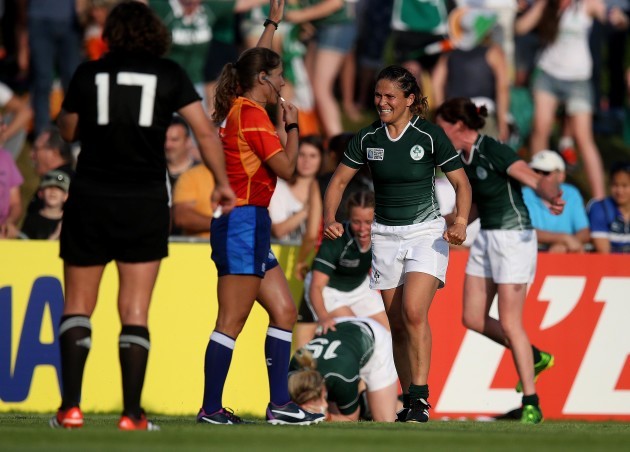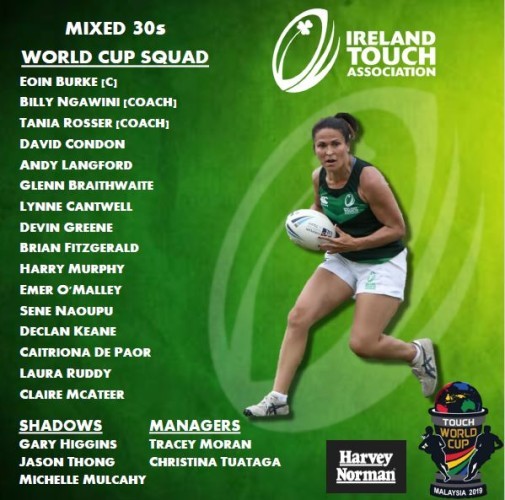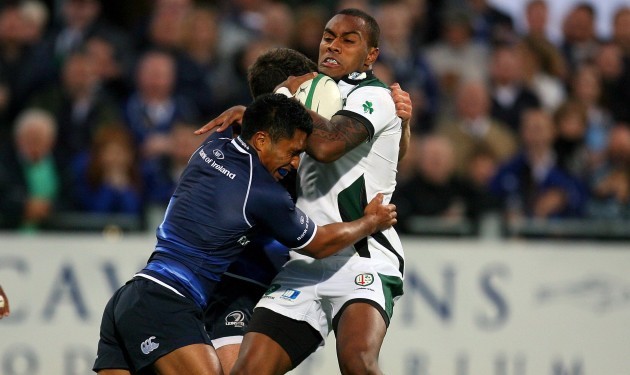TOUCH RUGBY WAS a central part of life for Tania Rosser from a young age in Hawke’s Bay in New Zealand and she’s hopeful that the six-player version of the sport is going to boom in Ireland too.
Rosser, who played in three World Cups for the Ireland Women 15s team, is part of the Ireland Touch Rugby squad heading to Kuala Lumpur in Malaysia for the Touch World Cup later this month.
She’s a passionate advocate of the benefits of Touch as a standalone game but also as a means of developing skills that are vital in 7s and 15s rugby.
“You go to any park in New Zealand and kids are playing Touch,” says Rosser.
“I’d love to get all schools in Ireland playing it, developing their skills from a younger age. Then it would also be great to get the participation in the women’s game evolved so that we feed from Touch into the likes of the 7s and the 15s. That would be awesome.”
The basic rules of Touch are straightforward.
The pitch is 70 metres long and 50 metres wide, so smaller than a standard rugby pitch. Six players from each team on the field at one time, with unlimited rolling substitutions from a squad of 14. Two 20-minute halves with a five-minute break in between.
A touch can be on any part of the body, clothing or ball. Six touches before the ball is turned over. No kicking. The ball in Touch is smaller, a size four rather than the size five that’s standard in 15-a-side.
“That’s one of the great things about Touch – your ball skills are perfected with a smaller ball and that crosses over to the size five ball,” says Rosser. “All of the evasion, finding space, that leads into 7s and 15s quite easily.”
The Ireland Touch Association say there are more than 500 adults playing Touch competitively in Ireland at present, with eight clubs in Leinster, four in Connacht and two in Belfast.
There are also senior social leagues around the country catering to around 1,200 players, while a Transition Year programme in seven Dublin schools caters to more than 500 youngsters.
Rosser is a player/coach in Ireland’s ‘Mixed 30s’ squad, which is made up of male and female players over the age of 30.
Also in the Mixed 30s squad heading to Malaysia are current Ireland centre Sene Naoupu and Grand Slam-winning midfielder Lynne Cantwell, while the hot-stepping Billy Ngawini – who had a spell with Leinster – is a player/coach too.
Ireland are sending more than 100 players to the World Cup, with four other teams – Open Mixed, Open Men’s, Men’s 40s and Men’s 50s. The fact that Touch involves mixed teams – usually meaning three male and three female players on the pitch at the same time – is another reason Rosser loves the game.
“It’s great because you’re on an even par with the males when you’re playing mixed.”
Rosser points out that some of New Zealand’s best 7s players have Touch backgrounds, while that’s even more pronounced in Australia.
Many of Australia’s 2016 Olympic-winning 7s squad came from Touch backgrounds and the last Touch World Cup saw the Australians winning all but one of the 15 different divisions.
Women’s 7s stars like New Zealand’s Niall Williams and Australia’s Charlotte Caslick underline to Rosser that Touch could add major value to the women’s game in Ireland.
Rosser says it’s been “heartbreaking” to watch the Ireland Women 15s team struggling recently. She feels Irish women’s rugby needs better grassroots coaches and would like to see international players playing more games. On top of that, she’s keen for women’s players to get involved in Touch, particularly during the summer months.
“When you watch players like Niall Williams running switches, it seems to happen naturally for them, whereas our girls seem to be having to call everything,” says Rosser. “I’d love them all to come down and play.”
Rosser is happy to be part of an Ireland team where the female players like herself take up playmaking roles, which was a key aspect of Ireland’s Mixed 30s winning the European Championships last year, beating England in the final.
“Our strength was our girls because Billy expects us to play, whereas other teams tend to leave their girls out on the wing just to finish tries,” says Rosser.
“Our girls can run and attack and pass the ball. Other teams wouldn’t use their females in the middle, so that’s a strength for us.”
But Rosser is keen to point out that benefits of Touch are there for players of any gender, with the pace of the game and its tactical nature providing strong opportunities to develop skills that are key in 7s and 15s too.
“It’s nice because you have to be tactical,” says Rosser. “You’re always thinking two phases ahead and trying to manipulate the defence. I love how tactical it is, even how you sub off the pitch.
“It’s not about just running off, you have to make sure you’ve got the ball in the right area of the pitch before you sub off.
“It’s really quick. We’ve told our guys that they’re not to be on the pitch any longer than 90 seconds.
“For the Australians and Kiwis, I think the average time they spend on the pitch is 72 seconds, put a lot into that and get off, then fresh people come on. It’s about being tactically smart.”
A Stage 4 IRFU coach, Rosser is an assistant with the Clontarf men’s 15s senior team and head coach of the J1 side at the club. She also somehow finds time for her other sporting passion, netball.
And if Rosser has her way, we’ll all be as enthusiastic about Touch in the near future.
Gavan Casey and Murray Kinsella are joined by Bernard Jackman to discuss Izzy Folau’s impending sacking by Australia and all the week’s news on the latest episode of The42 Rugby Weekly:
The42 Rugby Weekly / SoundCloud
Subscribe to our new podcast, The42 Rugby Weekly, here:



